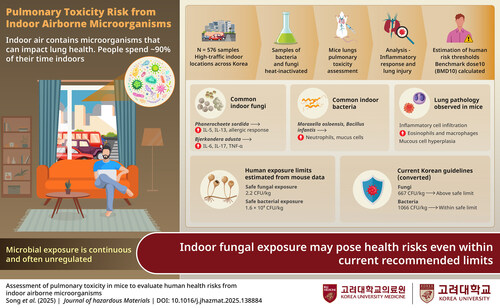18 July 2025 | Friday | Reports

Airborne microorganisms, including fungi and bacteria, are major contributors to indoor air pollution, with growing links to respiratory diseases. In a recent study, scientists from Korea explored the health effects of common airborne microbes by testing their toxicity in mice and calculating human-equivalent exposure limits. The results revealed that some fungi can cause lung inflammation and injury even at concentrations below current guideline levels, highlighting the need for species-specific indoor air quality standards.
Microbial contaminants like airborne bacteria and fungi can make up more than a third of indoor air pollution. Yet, while many countries regulate chemical pollutants, most have no legally binding thresholds for microbial exposure, particularly fungi. This lack of toxicological benchmarks leaves a major gap in indoor air safety policy.
Addressing this gap, a new study led by Professor Wonsuck Yoon of Korea University provides the first species-specific health risk estimates for indoor airborne microbes based on animal toxicity data. This study was made available online on June 9, 2025, and was published on Sep 5, 2025, in Volume 495 of the Journal of Hazardous Materials. This is the first study to estimate human health risks from indoor microbes using benchmark doses derived from animal toxicity data.
Prof. Yoon and his team collected microbial samples from more than 500 high-traffic indoor environments across South Korea, including restaurants, retail stores, and public transit hubs, and identified the most prevalent fungi and bacteria. Four representative species were then selected for controlled exposure studies in mice. Over four weeks, the animals were repeatedly administered doses of these inactivated microbes via their airways.
The results showed clear toxic effects: elevated levels of inflammatory cytokines, increased immune cell infiltration, and lung tissue damage, more specifically from fungal species. Based on these findings, the team calculated species-specific benchmark dose values and converted them into estimated safe exposure limits for humans.
"This work is a part of a national initiative on the health impact of indoor biological agents and highlights the limitation of total microbial load regulation, emphasizing that health risks can vary significantly by species," said Prof. Yoon.
The study determined that exposure to fungi may be unsafe even at levels below current South Korean and World Health Organization guidelines. By contrast, the estimated safe limits for bacteria were consistent with existing regulations. These findings could inform multiple applications: regulatory policy, building health certification, performance standards for air purifiers, and occupational safety in high-density spaces.
The researchers emphasize the longer-term importance of moving beyond crude microbial counts. "This approach will enable safer, smarter, and better health-optimized indoor environments across diverse urban and residential settings," said Prof. Yoon.
While the study offers a valuable first step toward species-specific microbial standards, the authors note that it was based on inactivated microbes and limited to culturable strains. Future work should include viable organisms and more comprehensive indoor microbiome assessments to better reflect real-world exposure and risks.
© 2025 Biopharma Boardroom. All Rights Reserved.